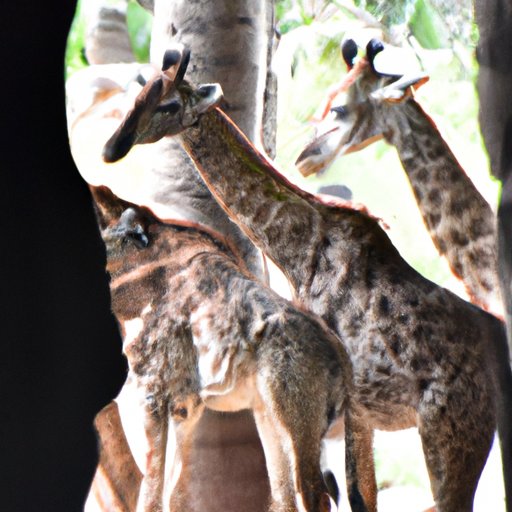Introduction
Zoos have long been an important institution, providing people with an opportunity to observe a wide variety of wildlife up close. But zoos are not only important for entertainment and sightseeing, but they also play a crucial role in conservation, education, and animal welfare.
Despite their contributions to society, zoos have faced criticism in recent years, leading many to question their purpose and the treatment of the animals in their care. In this article, we will explore the benefits of zoos and the crucial role they play in conservation, education, and animal welfare.
The Importance of Conservation and Education Through Zoos
Zoos play a vital role in conservation, as they provide a safe haven for endangered species and help conserve genetic diversity. They also work to educate the public about endangered species and how to protect them, helping to build a community of wildlife advocates.
In addition to their conservation efforts, zoos also aim to educate the public about animal behavior, biology, and environmental issues. The information provided by zoos helps people build a better understanding of wildlife and their place in the ecosystem.
Zoos around the world have made great strides in conservation and education. For example, the San Diego Zoo Global has reintroduced more than 30 species back into the wild, and the Smithsonian’s National Zoo has developed an innovative training program for keepers and handlers.
These efforts benefit both animals and humans. By educating the public about wildlife biology and the importance of conservation, we are better equipped to protect our planet and enhance biodiversity.
Behind the Scenes: A Look at the Care and Treatment of Animals in Zoos
Zoos have developed high standards for animal care, rehabilitation, and enrichment. These standards are designed to make sure that the animals in their care are healthy, happy, and safe.
Enrichment programs play a critical role in helping to improve the quality of life for animals in zoos. These programs aim to enhance the physical and mental well-being of animals through activities that mimic their natural behaviors.
Zoos also have veterinary care programs to ensure that animals receive proper medical attention when needed. In addition, rehabilitation programs help to return injured or orphaned animals to the wild when possible.
These programs benefit animal welfare, as they ensure that animals are treated with respect and care. By upholding the highest standards for animal care, zoos are promoting animal welfare both in captivity and in the wild.
The Positive Impact of Zoos on Local Communities
Zoos are more than just a tourist attraction; they also play an essential role in promoting the local economy and supporting community programs. They are a source of employment, as they require staff to manage the parks, conduct research, and run educational programs.
Many zoos also contribute to local charitable causes. For example, the Zoological Society of London has donated more than £10 million to conservation programs around the world.
Zoos are also vital in raising awareness of environmental issues in their local communities. They often run educational programs for schools and other groups, promoting environmental conservation and how to live in harmony with wildlife.

Why Zoos are Essential for Animal Welfare
Zoos play a crucial role in promoting animal welfare, both in captivity and in the wild. They help conserve endangered species, offer rehabilitation programs, and ensure that animals receive proper veterinary care.
Contrary to popular belief, zoos do not cause harm to the animals in their care. In fact, zoos provide a controlled environment in which animals can thrive without fear of predation, competition for resources, and habitat destruction.
Furthermore, zoos offer opportunities for scientific research, which benefits both animals and people. Scientists can learn about animal behavior and biology, leading to a better understanding of the natural world.
Debunking the Myths: Addressing Controversies Surrounding Zoos
Despite their contributions to society and conservation efforts, zoos have faced some criticism and controversy in recent years. For example, some critics argue that zoos promote the exploitation of animals and cause harm to their mental and physical well-being.
While it is essential to address these concerns, it is also important to recognize the positive contributions that zoos make. They play a critical role in promoting conservation, education, and animal welfare, and they serve as a valuable resource for scientific research.
Although controversies exist, it is important to weigh the negative with the positive when considering the role of zoos in society.
Zoos and the Future of Our Planet: The Role of Conservation Efforts for a Sustainable Future
Zoos have a critical role to play in promoting sustainability and a more equitable future for all. They have the potential to be powerful advocates for environmental conservation and climate action.
Zoos can act as key players in promoting biodiversity, habitat conservation, and sustainable resource management. They can raise awareness about environmental issues and inspire people to take action to protect the planet.
Some zoos have already started promoting sustainability initiatives, such as implementing energy-efficient and green practices and promoting ethical and sustainable consumer choices.
Conclusion
Zoos play a crucial role in society, promoting conservation, education, and animal welfare, and supporting local communities. Their importance cannot be overstated, and it is essential to recognize the crucial role they play in our world.
While controversies exist, it is vital to focus on the positive contributions that zoos make and to support their efforts towards a more sustainable future for all. By promoting wildlife conservation, education, and ethical animal treatment, we can ensure that these magnificent creatures continue to thrive both in captivity and in the wild.
Let us all support zoos and their conservation efforts to promote a more equitable and sustainable future for all.
